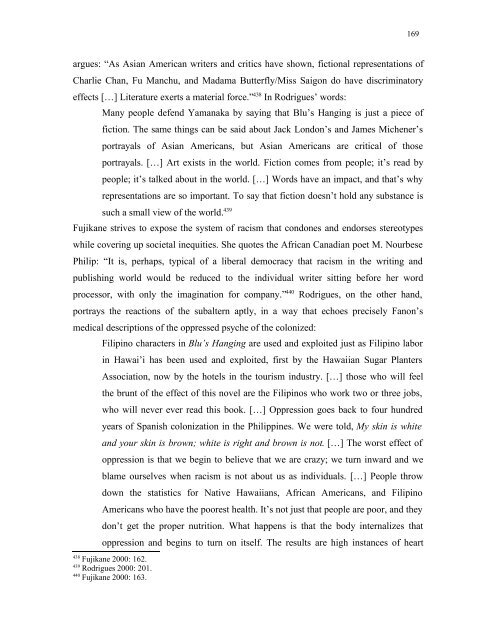A Paradise Lost - KOPS - Universität Konstanz
A Paradise Lost - KOPS - Universität Konstanz
A Paradise Lost - KOPS - Universität Konstanz
Create successful ePaper yourself
Turn your PDF publications into a flip-book with our unique Google optimized e-Paper software.
argues: “As Asian American writers and critics have shown, fictional representations of<br />
Charlie Chan, Fu Manchu, and Madama Butterfly/Miss Saigon do have discriminatory<br />
effects […] Literature exerts a material force.” 438 In Rodrigues’ words:<br />
Many people defend Yamanaka by saying that Blu’s Hanging is just a piece of<br />
fiction. The same things can be said about Jack London’s and James Michener’s<br />
portrayals of Asian Americans, but Asian Americans are critical of those<br />
portrayals. […] Art exists in the world. Fiction comes from people; it’s read by<br />
people; it’s talked about in the world. […] Words have an impact, and that’s why<br />
representations are so important. To say that fiction doesn’t hold any substance is<br />
such a small view of the world. 439<br />
Fujikane strives to expose the system of racism that condones and endorses stereotypes<br />
while covering up societal inequities. She quotes the African Canadian poet M. Nourbese<br />
Philip: “It is, perhaps, typical of a liberal democracy that racism in the writing and<br />
publishing world would be reduced to the individual writer sitting before her word<br />
processor, with only the imagination for company.” 440 Rodrigues, on the other hand,<br />
portrays the reactions of the subaltern aptly, in a way that echoes precisely Fanon’s<br />
medical descriptions of the oppressed psyche of the colonized:<br />
Filipino characters in Blu’s Hanging are used and exploited just as Filipino labor<br />
in Hawai’i has been used and exploited, first by the Hawaiian Sugar Planters<br />
Association, now by the hotels in the tourism industry. […] those who will feel<br />
the brunt of the effect of this novel are the Filipinos who work two or three jobs,<br />
who will never ever read this book. […] Oppression goes back to four hundred<br />
years of Spanish colonization in the Philippines. We were told, My skin is white<br />
and your skin is brown; white is right and brown is not. […] The worst effect of<br />
oppression is that we begin to believe that we are crazy; we turn inward and we<br />
blame ourselves when racism is not about us as individuals. […] People throw<br />
down the statistics for Native Hawaiians, African Americans, and Filipino<br />
Americans who have the poorest health. It’s not just that people are poor, and they<br />
don’t get the proper nutrition. What happens is that the body internalizes that<br />
oppression and begins to turn on itself. The results are high instances of heart<br />
438 Fujikane 2000: 162.<br />
439 Rodrigues 2000: 201.<br />
440 Fujikane 2000: 163.<br />
169

















